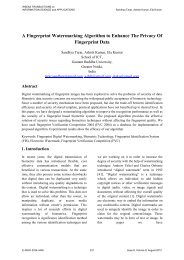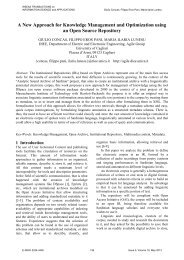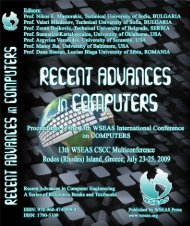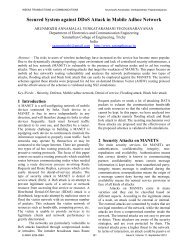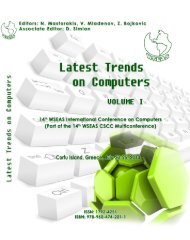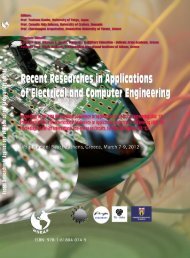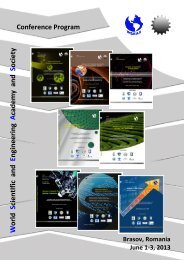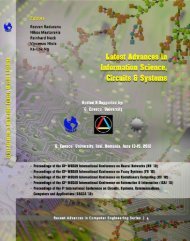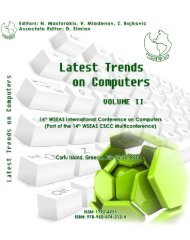Contents of this book - WSEAS
Contents of this book - WSEAS
Contents of this book - WSEAS
Create successful ePaper yourself
Turn your PDF publications into a flip-book with our unique Google optimized e-Paper software.
Recent Advances in Energy, Environment and Economic Development<br />
Plenary Lecture 6<br />
Concept <strong>of</strong> Sustainable Development under Pressure <strong>of</strong> Crisis: Case Study <strong>of</strong> Latvia<br />
Pr<strong>of</strong>essor Maris Klavins<br />
Department <strong>of</strong> Environmental Science<br />
University <strong>of</strong> Latvia<br />
Riga, Latvia<br />
E-mail: maris.klavins@lu.lv<br />
Abstract: The sustainability concept is recognized as one <strong>of</strong> the key importance principles for the development and<br />
its planning. In the same time the actual importance <strong>of</strong> the sustainability in the development process differs quite<br />
significantly worldwide. Also in Latvia sustainable development (SD) is considered as a basic principle for the<br />
development <strong>of</strong> the country at the level <strong>of</strong> the basic state policy declarations. This is especially important if financial<br />
resources are limited, when society is faced by major social, economic and environmental problems as in the Baltic<br />
States. Sustainable development planning include possible solution identification, economic considerations, the<br />
public opinion formation process and scientific expertise as well as subjective factors in connected with the general<br />
process in the society. Economical aspects do have a great importance in the setting the priorities. The processes<br />
influencing sustainability prospects in Latvia and its impact on environmental policy depending on problems <strong>of</strong><br />
restructuring <strong>of</strong> national economy has been studied. The communities <strong>of</strong> western countries play a great role in the<br />
transition process and the increased internationalization <strong>of</strong> identified problems. Of these, environmental problems<br />
have a high priority. Environmental problems are <strong>of</strong>ten international such as transboundary transport <strong>of</strong> airborne<br />
substances and pollution <strong>of</strong> the Baltic Sea. The internationalization <strong>of</strong> environmental questions plays a crucial role in<br />
the strengthening <strong>of</strong> democratic traditions and newly developed democratic institutions in the formed Republics.<br />
Thus, the rapidly changing economic system, and also character <strong>of</strong> environmental problems requires development <strong>of</strong><br />
environmental policy oriented towards local rather than international problems.<br />
However the actual interpretation <strong>of</strong> the sustainable development concept even at the level <strong>of</strong> state policies does not<br />
follow the basic principles <strong>of</strong> the SD. The sustainability concept <strong>of</strong>ten is identified as a need to develop nature<br />
protection capacity and classical conservationism is regarded as a basic element <strong>of</strong> the SD.<br />
In <strong>this</strong> study the role <strong>of</strong> sustainable development has been analysed from perspective <strong>of</strong> its importance in the national<br />
planning processes and analysis <strong>of</strong> achieved progress. A major emphasis has been put on the analysis <strong>of</strong> economic<br />
crisis on the implementation <strong>of</strong> sustainable development. As a significant part <strong>of</strong> the sustainable development is<br />
considered the character <strong>of</strong> development and implementation <strong>of</strong> SD in the planning <strong>of</strong> cities and in general, urban<br />
territories. A new challenge for the demonstration <strong>of</strong> the readiness to follow the sustainable development is the<br />
ongoing development planning process and the existing way <strong>of</strong> development <strong>of</strong> national economy.<br />
The achieved progress in environmental education in Latvia can support the development <strong>of</strong> education for<br />
sustainable development aimed at the promotion <strong>of</strong> values and ethics through education at different levels in order to<br />
make an impact on people's lifestyles and behavior and help to build a sustainable future.<br />
Brief Biography <strong>of</strong> the Speaker:<br />
Maris Klavins graduated from the University <strong>of</strong> Latvia in 1979, doctoral dissertation defended in Moscow University<br />
(Russia) in 1985, but habilitation thesis in University <strong>of</strong> Latvia in 1993. Maris Klavins (pr<strong>of</strong>essor, dr.habil.chem.) is<br />
head <strong>of</strong> Environmental science department <strong>of</strong> Faculty <strong>of</strong> Geography and Earth sciences, University <strong>of</strong> Latvia.<br />
M.Klavins is member <strong>of</strong> editorial boards <strong>of</strong> 6 scientific journals, member <strong>of</strong> 3 societies related to environmental<br />
chemistry issues and full member <strong>of</strong> Academy <strong>of</strong> Sciences <strong>of</strong> Latvia. M.Klavins has been leader <strong>of</strong> several projects<br />
related to the environmental issues mostly doing with environmental pollution and management, and quality <strong>of</strong> water,<br />
but including also political and social sciences and sustainable development science.<br />
ISBN: 978-1-61804-139-5 19



